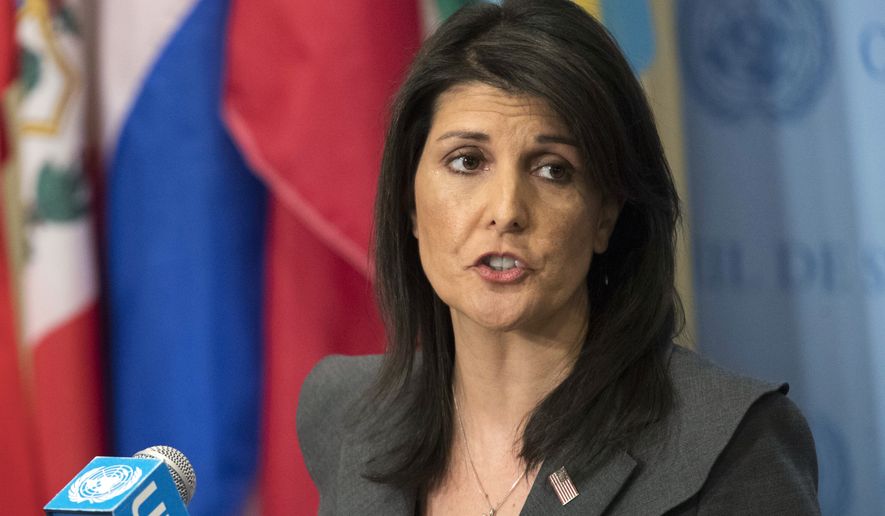The Trump administration has pulled the U.S. out of the United Nations’ main human rights body because of long-standing complaints that the panel is biased against Israel, U.S. Ambassador Nikki Haley and Secretary of State Mike Pompeo announced Tuesday.
“For too long, [the U.N. Human Rights Council] has been a protector of human rights abusers and a cesspool of political bias,” Mrs. Haley said. “Regrettably, it is now clear that our call for reform was not heeded.”
The U.S. made the move a day after U.N. officials sharply criticized President Trump’s handling of refugee families at the Mexico border.
The withdrawal is unprecedented in the council’s 12-year history. Libya was ousted seven years ago, but no other country has ever departed voluntarily. U.N. observers said they had seen it coming since the Trump administration’s start.
Last year, during her first address to the council, Mrs. Haley threatened the withdrawal. She cited Washington’s long-standing complaints that the 47-member Geneva-based council was biased against the Jewish state and warned members that the U.S. would leave if the panel failed to end its systematic scrutiny of alleged Israeli rights abuses against Palestinians.
“It is essential that this council address its chronic anti-Israel bias if it is to have any credibility,” she said.
She noted that resolutions had been passed against Israel but none had been considered for Venezuela, where protesters were being killed amid political turmoil.
During a joint appearance with Mr. Pompeo on Tuesday, Ms. Haley said the United States “would be happy to rejoin” if the council undergoes reform.
Mr. Pompeo ratcheted up the rhetoric by indicating that such a development could be far down the road.
“We have no doubt there was once a noble vision for this council,” he said. “But today we need to be honest. The Human Rights Council is a poor defender of human rights. Worse than that, the Human Rights Council has become an exercise in shameless hypocrisy, with many of the world’s worst human rights abuses going ignored and some of the world’s most serious offenders sitting on the council itself.”
Last week, reports speculated that the failure of frenzied behind-the-scenes negotiations to reform the body would trigger the Trump administration’s move. A major point of contention: Washington’s objection to Israel being the only country in the world whose rights record arose every council session as “Item 7” on the agenda.
Minutes after Tuesday’s announcement, Israeli Prime Minister Benjamin Netanyahu tweeted his thanks to the U.S.: “Israel thanks President Trump, Secretary Pompeo and Ambassador Haley for their courageous decision against the hypocrisy and the lies of the so-called UN Human Rights Council.”
Some observers noted that the move reinforces the perception that Mr. Trump is seeking to advance Israel’s agenda on the world stage ahead of a long-awaited White House peace plan for the Israeli-Palestinian conflict. Mr. Trump’s son-in-law and senior adviser, Jared Kushner, is visiting the Middle East this week as the White House prepares to announce its plan.
Human rights advocates denounced the administration’s action.
“The Trump administration’s withdrawal is a sad reflection of its one-dimensional human rights policy,” said Kenneth Roth, executive director of Human Rights Watch. “Defending Israeli abuses from criticism takes precedence above all else.”
Democrats on Capitol Hill slammed the administration for stepping back from another international agreement, after withdrawals from the Paris climate accord, the U.N. educational and cultural organization and the Iran nuclear deal.
Senate Foreign Relations Committee member Christopher A. Coons, Delaware Democrat, said in a statement that the U.N. Human Rights Council is not perfect but the withdrawal sends a clear message that the administration “does not intend to lead the world when it comes to human rights.”
Rep. Nita M. Lowey, New York, called the move “another isolationist maneuver in its foreign policy strategy that is weakening U.S. global leadership.”
But some leading allies, including the United Kingdom, indicted they were firmly on board.
British Foreign Secretary Boris Johnson joined Washington on Monday in criticizing Item 7 and urging the council to reform. Other European nations and Australia have also sided with the Jewish state, noting that countries with worse human rights records, including Syria, were spared such intense scrutiny.
A key question is where a continued U.S. retreat in the U.N. would leave a beleaguered Israel.
The U.N. Human Rights Council was created in 2006 to replace the U.N. Human Rights Commission, which was widely discredited for electing member states with questionable track records on human rights.
The year it was created, the George W. Bush administration decided against seeking membership. The U.S. joined in 2009 under President Obama.
• This article is based in part on wire service reports.
• Dan Boylan can be reached at dboylan@washingtontimes.com.




Please read our comment policy before commenting.